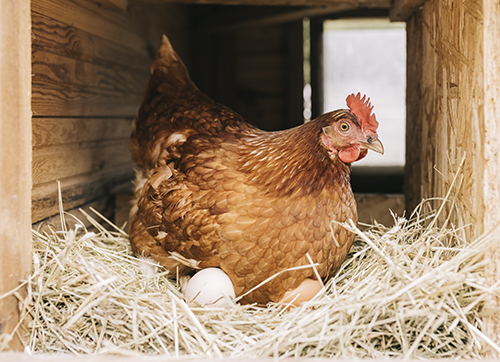Keep your Chickens in Optimal Health this Summer
May 31, 2022

The days are getting longer and the sun’s rays are getting stronger, which means summer is drawing near. We, as humans, have the ability to put on cool clothes and adjust to the increased heat levels. However, our chickens cannot adapt as easily and can quickly become overheated in temperatures over 90 degrees Fahrenheit. Birds do not have the ability to sweat, so you will often notice them spreading their wings or opening their beaks to cool down, but this is not always enough.
As the caretaker of these animals, we are responsible for keeping the flock in optimal health. A few signs of heat stress and heat stroke in chickens are panting, lethargic behavior, decreased appetite, low egg production, and pale or discolored combs and wattles.
Here are four ways to ensure that your backyard flock stays in ideal condition.
Hydration
A chicken typically needs 500 milliliters of water every day. Beyond giving them constant access to fresh, clean water, ensure that your backyard flock is hydrated by mixing electrolytes into their water, providing ice cubes, and placing extra waterers in shaded areas. Also, consider dropping marbles into the water to prevent the chickens from splashing around and spilling their water supply.
Ventilation
The heat not only affects the chicken outside, but also in the coop. Lack of ventilation can cause the flock distress, but luckily, there are some small adjustments that can be made in the coop that go a long way. By simply adding a fan, opening the windows, and avoiding overcrowding, your flock will be able to enjoy the benefits of fresh air.
Cold Treats
Having frozen treats available to the flock will allow their internal body temperature to lower. While our choice of a cold treat may be ice cream or popsicles, chickens enjoy frozen peas, watermelon, and strawberries. You can also make your own treat blocks with water and berries!
The right feed
In looking for the best feed for your backyard flock, pay attention to the ingredients. During the hot months of summer, it is best to feed a crumble or pellet feed with a protein level between 16 and 20% and that has omega-3s. You can also use oyster shells to maintain calcium intake and eggshell quality.
Your local Co-op carries all the supplies you need to keep your flock cool this summer such as waters, feeders, and quality feed.
For more content like this, check out the latest issue of the Cooperator.
As the caretaker of these animals, we are responsible for keeping the flock in optimal health. A few signs of heat stress and heat stroke in chickens are panting, lethargic behavior, decreased appetite, low egg production, and pale or discolored combs and wattles.
Here are four ways to ensure that your backyard flock stays in ideal condition.
Hydration
A chicken typically needs 500 milliliters of water every day. Beyond giving them constant access to fresh, clean water, ensure that your backyard flock is hydrated by mixing electrolytes into their water, providing ice cubes, and placing extra waterers in shaded areas. Also, consider dropping marbles into the water to prevent the chickens from splashing around and spilling their water supply.
Ventilation
The heat not only affects the chicken outside, but also in the coop. Lack of ventilation can cause the flock distress, but luckily, there are some small adjustments that can be made in the coop that go a long way. By simply adding a fan, opening the windows, and avoiding overcrowding, your flock will be able to enjoy the benefits of fresh air.
Cold Treats
Having frozen treats available to the flock will allow their internal body temperature to lower. While our choice of a cold treat may be ice cream or popsicles, chickens enjoy frozen peas, watermelon, and strawberries. You can also make your own treat blocks with water and berries!
The right feed
In looking for the best feed for your backyard flock, pay attention to the ingredients. During the hot months of summer, it is best to feed a crumble or pellet feed with a protein level between 16 and 20% and that has omega-3s. You can also use oyster shells to maintain calcium intake and eggshell quality.
Your local Co-op carries all the supplies you need to keep your flock cool this summer such as waters, feeders, and quality feed.
For more content like this, check out the latest issue of the Cooperator.